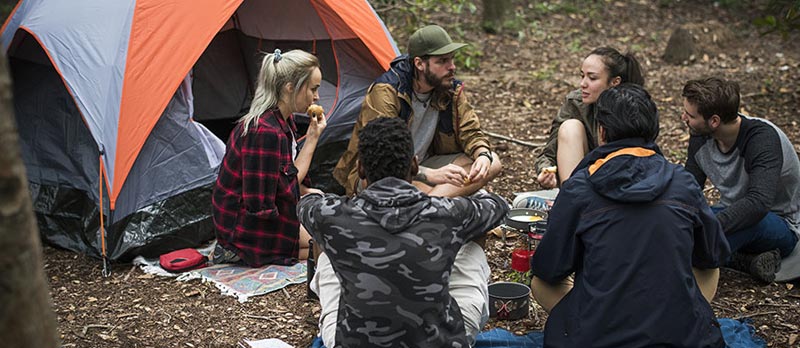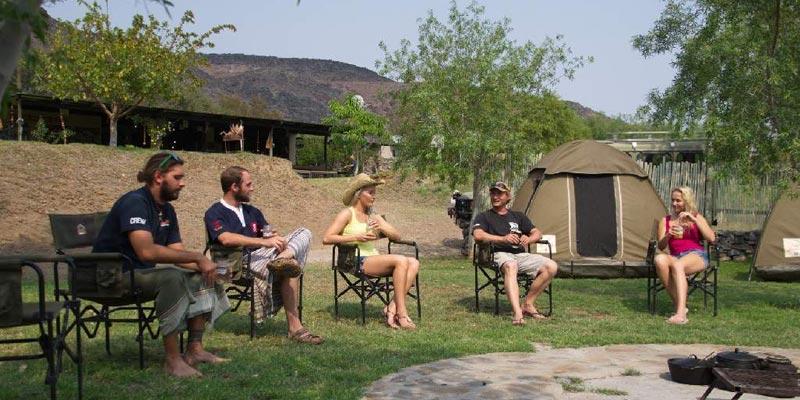As like our home and neighbor area, we should also be alert about the camp side. This can be applied to both humans and nature. The whole thing is discussed in a topic called camp etiquette.
What is Camp etiquette?
It’s a way to spend quality time with family and friends & connect with nature. It also ventures to new surroundings, simply relaxing, and breathing in nature. Visitors need to adhere to various guidelines while hiking and biking on trails, in campgrounds & recreation sites.
We can call it camping etiquette & it’s like being safe & respectful. The campsite neighbors will like this & the nature surrounding you depends on. Rules vary from park to park.
Why Camping Etiquette Is Important
Millions of camping households are available in the U.S. Not every place is run by the same camp etiquette. You may be new but you need to learn about the rules and regulations before going camping.
RELATED: Best Places to Camping in USA
Having Vitamin D
If you go outside, your body continuously absorbs a lot of quantities of sunlight. Our Sun gives a good quality outdoor glow to our skin. The body uses it to synthesize Vitamin D that helps your body to absorb Calcium & Phosphorus, 2 minerals that are essential for the healthy bones and teeth of animals.
Get Better Sleep
Melatonin is a natural body-made hormone that helps to control sleep & wake cycles. At the time when you are engaged in an office for a long period and working under artificial light, the melatonin level is suppressed by the blue light from sources like incandescent bulbs.
When you camp outside, it is already under melatonin-friendly yellow light that can help to achieve natural alignment of the sleep & wake cycle according to Sunrise & Sunset.
For Improving Memory
While you are camping, you are surrounded by trees & fresh air. The body releases more serotonin. Serotonin is a naturally produced neurotransmitter. It helps to regulate our mood, & sleep. Serotonin also improves cognitive functions of our body like memory & learning.
You can recall your memory better than earlier. This helps students to get more grades in school and grownups to concentrate on complicated issues.
Good Relationships
We often see that we never talk to our family & when we look around us, everyone is using gadgets. To come closer to loved ones & good friends, we can communicate directly & give & receive eye contact by a quality camping.
Without depending on each other for preparing food & looking after our campsite builds, an idea of community & shared purpose that adds to our wellbeing.
Reduced Day to Day Stress
The benefits of camping are that it can reduce stress by removing general triggers like traffic, job pressure & the rush of city life. We can replace them with the gentle effect of birds chirping, the sound of water crashing on the sea beach & the wind across the trees. This is more therapeutic than anything you’ll find on your gadget.
Working Out
We need more physical exercise to store food, gather, prepare & get around a campsite & manage our shelter. We can go further by adding walking, fishing, swimming, or bike riding that give cardiovascular benefits & calorie burning.
Quiet and Calm Environment
We can enjoy the calmness of nature without those gadgets. No more charging our gaming consoles, smartphones & tablets. Instead, recharge our own brain and mind. The body & soul will thank us for it.
We will return to work refreshed & energized. We can turn off the news, the internet & emails. Just charge the phone for emergencies.

What Camping Etiquette is the Top Most to Consider
Camping is a good way to get away from a busy life with endless input, full of traffic & crowds. We can enjoy the smell of a campfire burning, the sky full of stars, hot dogs on sticks & more.
During the time to relax, an unruly neighbor who cranks up his music, talks loudly & allows their kids & pets to run all over the place can ruin your time. People often forget that they’re making other campers uncomfortable.
If you have a good neighbor in the campground, then the trip will be peaceful. Campground etiquette rules everyone should follow. Here is some basic campground etiquette for camping beginners.
01. First of All Choose the Right Campground
Varieties of campground types are available like specific kinds of people & equipment. Some of them are for RVs only. While others allow a mix of travel trailers, RVs, pop-up campers & tents.
The accurate campground for a group depends on many issues like how long they’ll be staying, the type of equipment, the experience level of the group & how they like to enjoy the camping experience.
A quiet couple is more comfortable in a small campsite beside a lake, a dispersed camp in the middle of the forest. A family might like a full service, safer family campground. Camping is fun if it’s done right.
By following the rules, campers will find that their campground experience is a happy one.
02. Always Keep it Clean
Leave the campsite better than it was earlier. Clear out old brush, plant debris & raking a spot for the tent are great ways to improve a campsite. It deters insects & critters. Not everyone cleans up after themselves.
Campers have to pick up trash left behind by others. They need to place their trash in a designated can. They can also pack it out if there is no bin. Leave no excuse for leaving garbage out in a campsite.
03. Contain the campsite
Stay within the bounds of the designated campsite. The picnic table, tent, camper & other items are placed next door. Always arrange things in such a way that they’re not impeding on the neighboring site.
Have some room for people to cook & clean up. Bring out the items that are necessary. Leave things in the car until they’re needed.
04. Always Stay Organized
Camping needs some organizational skills. Pack everything that’s important for the duration of the stay. Have those by which meals and snacks can be prepared. Keeping them accordingly means having little baggies, many plastic totes & storage containers to hold everything.
05. Clean Campfires & Flames
People stay around the campfire to cook. They share the day’s tales. Use the right amount of fire rings. Always make sure that weeds, tree branches & any dry materials are out of reach of the flames.
The fire shouldn’t be unattended. Completely put out the fire when finished by pouring water on the coals. There are places near campgrounds for buying firewood. Those firewood bundles are hardwood & difficult to get them to burn.
A tinder bundle & kindling will work. Pick up dry branches & wood chunks. A shopping bag is a good stick collecting bag. Give kids a bag & send them out. Clean campfires properly are the topmost to consider of camp etiquette.
06. Camping Vehicles & Machines
Camping should be about enjoying nature’s sights, sounds & smells. Using vehicles, A/C, generators are not natural sounds. They produce fumes. Avoid running noisy motors that disturb the natural peace. Other campers came to the forest to enjoy themselves.
07. Setup Lighting
Sometimes campers hang strings of lights around their rig. It’s decorative to add some light when it gets darker. Flashing lights are just decorations. Those lights don’t just illuminate the campsite, that also affects other campers.
People want to see the stars that the bright lights of the city don’t let us see.
08. Controlling Pets if Any
At some campgrounds, pets are allowed. Keep the dog on a leash. Never leave the pet in a campsite alone. Make sure that barking doesn’t bother anyone. Clean up although the campground is remote.
09. Control the Music
Good music creates a cool environment for an awesome camping trip. If there are other people around, lower the volume. Watch the volume so that you’re not disturbing others. You may use earphones or headphones.
10. Mind Your language
The tent fabric is thin & camper walls aren’t insulated. Everyone can hear a louder voice. It might be offensive in a family-friendly area. A decent camper keeps his conversations private & avoids rough language around children. Censorship goes a long way in some environments.
11. Always Keep the Kids Quiet
It is a good place for kids to play. Parents should look after their children. Make sure they’re safe & not disturbing other campers.
12. Always Respect the Facilities
The authority provides toilets, showers, changing rooms & sinks for cleanliness. A real person cleans those areas every day. Leaving the sink messy & forgetting to flush are rude. Follow the facility like it’s a personal space at home. Clean up after each use.
13. You Should Respect Other Campers
People are looking for quiet & solitude. People aren’t looking for new friends. Some folks are social. Others would keep to themselves. Always respect other campers. Leave them alone. Limit conversations & interactions.
14. Respect Mother Nature
The most important camp etiquette is don’t interact with wildlife. Don’t dig up any trees. Never cut down any live trees for firewood. Follow every step that’s taken & try to avoid damaging valuable habitats.
15. Law of The Land
Always Respect the rules where you’re camping. Make sure to check posted signage & talk with the camp host. Respect laws in places where pets are invited and where to dispose of waste.
16. Stake Your Claim
Set the tent up in established spaces to protect the surrounding area by keeping it natural. Don’t set up too close to water. Stay 200 feet away from rivers or lakes.
